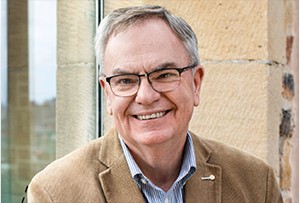In December, I will attend the United Nations COP28 climate change summit in Dubai, United Arab Emirates. There, I will speak about the convergence of two global crises: climate and mental health. As the World Health Organisation has noted, climate change worsens risk factors — such as disruptions to homes and livelihoods — for mental health problems. The emotional distress of a disaster also makes it difficult for people to recover and rebuild.

Rotary partner ShelterBox is an international disaster relief charity that has helped more than 2.5 million displaced people in approximately 100 countries with emergency shelter, essential household items, and technical support. I wish to share this month’s column with their CEO Sanj Srikanthan who explains that the words we choose to describe disasters matter.
— Gordon McInally
The term “natural” disaster has long been used to describe tropical storms, floods, earthquakes, and volcanic eruptions, but there needs to be an urgent shift in the language we use. While the term may seem harmless, and we’ve not always gotten it right, we’ve learned through our work with disaster-affected communities how it perpetuates a dangerous myth that nothing could have been done to prevent people being so badly affected. This misleading and harmful narrative can lead to a lack of action to help people who need it.
The language we use matters. When we frame disasters as natural, we fail to acknowledge the complex interplay between nature and the role of human actions and how they impact communities around the world.
Earthquakes, tsunamis, volcanic eruptions, extreme storms, drought and flooding occur because of natural processes on Earth. But it is how these events affect people or the environment that has the potential to make them a disaster — outcomes influenced by human factors like where people live, what types of homes they have, political instability, and the lack of proactive measures to protect vulnerable communities. A disaster is the result of systemic inequalities in access to resources and power. Where we live and how much money we have often determine our ability to recover. The people worst affected are those living in poverty, with the least means to protect themselves and few resources to withstand the next event.
By framing these events as natural, we undermine the need for proactive measures to protect vulnerable communities, masking the underlying social, economic and political instability that make marginalised and disadvantaged communities disproportionately affected. Our teams see firsthand how issues like inequality, poverty, urbanisation, deforestation, and the climate crisis can make communities more vulnerable.
At ShelterBox, we simply say “disaster” or are more specific, describing the extreme weather, earthquake, tsunami, or volcanic eruption. I urge everyone to help us in breaking this cycle by committing to language that accurately reflects why people are affected so badly.
Only then does it pave the way to address the underlying causes of vulnerability and work toward a more just and equitable future for all, with the necessary investment, resources, and proactive measures to help protect affected communities.
Disasters are not natural. Let’s stop saying they are.
Sanj Srikanthan
CEO, ShelterBox





